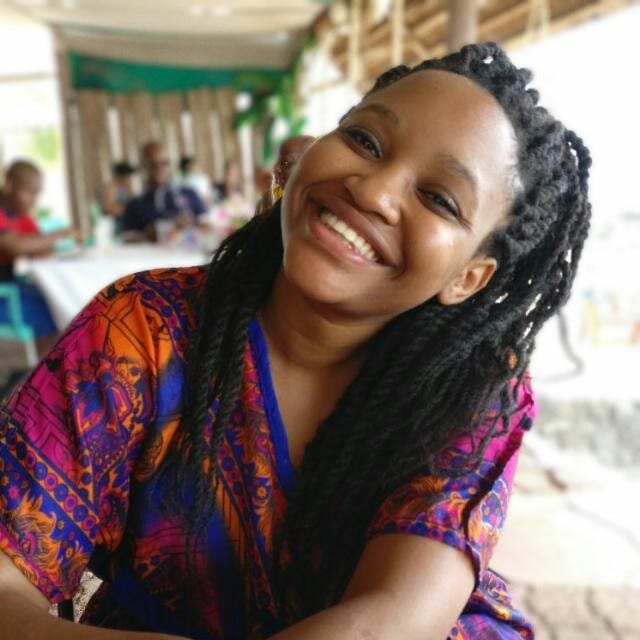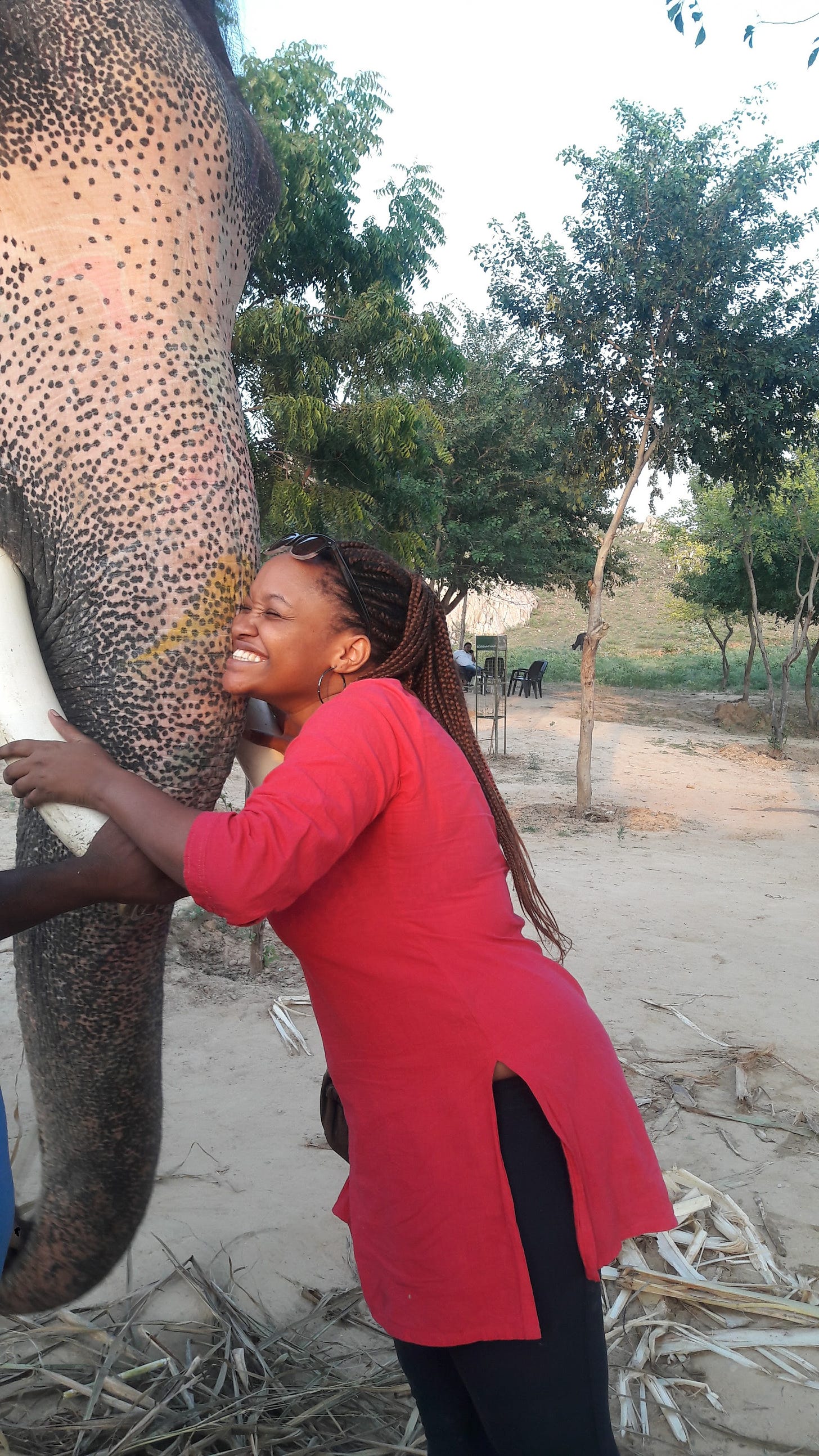"On a journey to my final form"
5 questions for podcast host and matrix transcender Nguhi Mwaura
Nguhi Mwaura was my first blind date.
The Skoll Foundation and the Aspen Institute wanted to create a podcast that looked critically and expansively about how change actually happens, and somehow Nguhi and I came to mind as potentially dynamic conversation partners. That podcast, solvers, launches next Thursday, 4/22, but the trailer is out now. If you like this newsletter, chances are you’ll dig this podcast — more examined life, but on a global scale. Lots of skepticism, mixed with joy and generational endurance. Subscribe and tell me what you think. I’d be so grateful for your feedback.
Meanwhile, I’m so excited to introduce you to Nguhi. Like the best blind dates, I fell for her luminous smile immediately, but really became enraptured with her bright mind, unfailing honesty, and visionary heart. She’s one of those people who exists in a no bullshit zone—a place of no fakery or transaction, no empty calories or soothing words for a shattered world. I have already learned so much from her and feel honored to have been in conversation with her over the last few months. And now you get to meet her…
Courtney Martin: When you were a little girl, what did you think you were going to be when you grew up?
Nguhi Mwaura: I do wish I was one of those kids who was just clear from the beginning- I want to be a lawyer or a doctor or a pilot. As a kid (and maybe even now) I would go from thing to thing. I wanted to be a trapeze artist because the circus seemed so glamorous, and a singer, like Whitney, or a pediatric cardiologist (those were just two big words I could say to adults). I wanted to be a diplomat for a really long time. I think though, all in all, I wanted to adventure.
What are you? (Joking/not joking.) How do you describe what you do in your own terms these days?
I was unemployed a couple of years ago and the question “what do you do?” became the most dreaded question ever. I was really unclear about what came next so I couldn't do the “I'm in between gigs” because it felt like a lie. It felt like I had no value beyond what I did, what money I made, or what connections I had. I did a lot of work in that time to think about decoupling my identity from what I do for money.
So what I do: on my best days I think about the kind of world I would like to live in and I take on projects and jobs that I feel are giving me the tools or platform to be a part of the future world-building. On my worst days, I think about how to equip myself to survive the apocalypse.
I like to think of myself as being on a journey to my final form (like a Pokemon). My final form has everything to do with just being a liberated human at peace with myself and the world.
In our short time of collaborating and becoming friends, you’ve already taught me a lot about the importance of decolonizing, not just our society, but our souls. When did you first encounter the idea and what do you recommend newbies read, watch, or listen to on it?
I never really thought of “African” as an identifier of mine until I was about 18. I was getting ready to go off to University and I read this book, Zenzele by Nozipho J Maraire. It a letter from a Zimbabwean mother to her Harvard-bound daughter. This book kickstarted the process of questioning everything and a process of unseating whiteness as a central compass for me.
Part of being a colonial subject is how aspirations to whiteness are centered because it is closer to civilized. And you get inducted to it in such subtle ways that it takes years of unpicking to work through. “Good schools” are white schools and “international curriculums” are inherently superior to local curriculums.
I grew up reading Enid Blyton like my mum did except for where she didn’t taste apples or see snow until she was an adult, I experienced those things as a normal part of my childhood. and that represented “progress.” But the question that I started asking was where was that progress leading to and was it even possible to ever get there when ultimately the goal felt like it was to “be white.”
I went to a university on the continent and I am grateful because I got to meet myself as a “post” colonial subject in a lot of my classes. Reading Biko, Fanon, Mamdani, Said—were all crucial to unpacking the psychological effects of the colonial effort and how neo-colonialism keeps Africa deliberately underdeveloped.
I constantly find little slivers of that residual internalized white supremacy in me. So I’m working on it. And its a necessary part of my growth because if I cannot have self-acceptance or love myself while believing in any small doses that the place that I come from or the skin I am in is inherently inferior. I don’t have great hope for non- Africans or non Black people doing this work, because it is work and labor. It is easier to believe in famine and war-filled dark continent, or even a Wakanda, but not to interrogate the complexities of a place with its 54 countries, and complex history.
But on the other side of it, I would say you get to meet your humanity, empathy curiosity.
What was your biggest surprise in the making of this podcast?
I was surprised by how much I learned. I learned and benefitted from a lot of grace from our amazing producer (shout out to Golda Arthur) and the rest of the amazing team. I had no idea what it takes to make a podcast…and it turns out it’s a lot.
I learned from you, Courtney, and how as part of your interview style you offer up yourself and your life experience. So generous with what you know and where you are still learning. I feel like you show up in that whole-hearted way that Brene Brown talks about and I can only aspire to.
I have tried to adopt this idea I heard in a DEI training once: “Listen deeply enough to be changed” and listening to you talk to guests and in some of the conversations I’ve had too, I know that I’ve come away with nuggets of truth that have challenged me about how I’m showing up in the world. I really do think that this experience has shaped me more than I could have anticipated when I said yes to doing it.
If you could interview three Solver ancestors, who would you choose?
Gandhi, MLK and Jesus: this is where you say BASIC, Courtney. [HAHA! This is a reference to my unsavory habit of hating on people when they suggest really obvious sources of “inspiration quotations.” Sorry/not sorry.]
Wangari Maathai, Bantu Steve Biko, and Toni Morrison. What I would want to hear from each of them is: how did you see through the "matrix?" How did you see through the system that tells you that you are inferior and less than, and despite the demoralizing and degrading things you are put through? How did you hold onto the idea that I am somebody and what I am doing matters? I would love to hear what their words to live by are, because they’ve given me some of mine.
Nguhi requested that our donation this week go to Trans & Queer Solidarity Fund Kenya. Maybe some of us with extra cushion could become monthly donors there? That would be dreamy.
And subscribe to our podcast please so you can hear Nguhi’s brilliance in oral form.







Thank you!